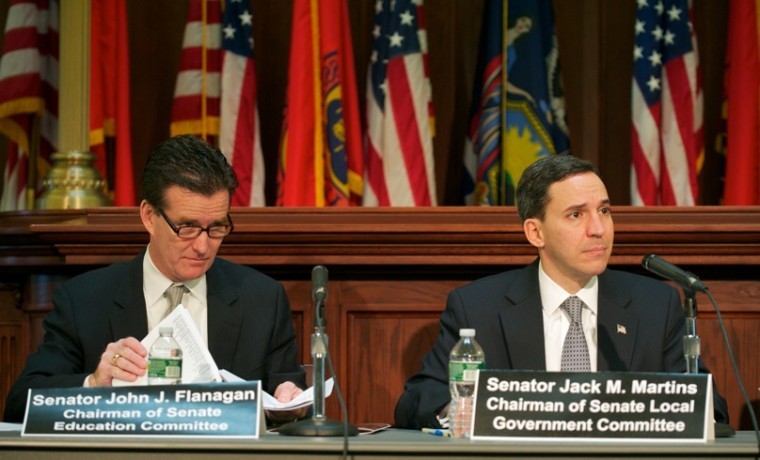
The public hearing on tax cap and mandate relief organized by state Sen. Jack Martins (R-Mineola) and Sen. John Flanagan (R-Smithtown) last week was billed as the “True Path” to reducing the state’s real property tax burden.
But while many concepts recurred during the five-hour hearing at the Theodore Roosevelt Executive and Legislative Building, the paths speakers at the forum suggested often diverged.
Great Neck Superintendent of Schools Thomas Dolan told the senators that “mandate relief is the only option open to us.”
Dolan had a laundry list of suggestions, including basing school district transportation requirements on actual use of seats on school buses rather than guaranteeing a seat for each student who might use the bus.
Dolan also suggested dumping the requirement for annual reports on the incidence of violence and corporal punishment in each school district, teacher mentoring costs of $100,000 a year in Great Neck (which he said would continue without the cost), $50,000 for internal auditors, the requirement to supply students with calculators (a $70,000 annual expense in Great Neck), and excessive standardized testing among students in grades 4-8.
Mineola Superintendent of Schools Michael Nagler suggested that school districts should be able to override the 2 percent tax levy cap in school budget elections by a “simple majority” rather than the 60 percent plurality the recently passed law would require.
Nagler also joined the disparate group of speakers who endorsed the concept of restoring public employee pension contributions.
“A non-contributory pension system is no longer viable in the present environment,” he said.
Following the opening remarks of the panel of state senators assembled to hear testimony, Peter Baynes, executive director of the New York Conference of Mayors, said the legislature ought “to provide for tax relief that genuinely helps local governments.”
Baynes suggested that the legislature find a way to reinstate the 3 percent pension contribution rate for public employees in Tier III and IV. Failing that, he said, “another legal equitable way must be found.”
Flanagan said he did see legal problems with reinstating the contribution system Baynes endorsed.
Baynes replied that restoring those contribution rates would lower state Employee Retirement System costs by 20 percent over 10 years, “which we think is significant.”
Municipalities should be permitted to negotiate health insurance contribution rates with local employees, Baynes said, with rights to implement minimum contributions for villages and school districts to be “phased in” over two years.
Baynes said the mayors conference’s position on the tax cap is that “it will discourage economic development in New York,” and he criticized the exclusion of new ratables in the tax cap in their first year on local tax rolls. He also said that health insurance and pension costs should be excluded from tax cap calculations.
E.J. McMahon, senior fellow at the Manhattan Institute, a conservative think tank, told the senators he thought they were at least on the right track with the recent passage of the 2 percent property tax cap that takes effect in 2013.
“By passing the [tax] cap, you’ve committed yourself to stop passing the buck,” McMahon said, although he added that some upstate municipalities might have to stop clearing snow from some of the streets.
Martins asked McMahon what he thought the biggest “cost drivers” need to be addressed by the legislature. McMahon pared down what he had called a “12-step” financial rehab program for the state to four points, giving “highest piority” to elimination of the Triborough Amendment, which provides for step increases for public employees even in the absence of a contract. A statewide pay freeze for all public employees was second on his list followed by long-term pension reform.
“If you one want another generation of New Yorkers to go through this, you’ve got to change the system,” McMahon said.
McMahon said amending compulsory arbitration also is vital since it has a “steady racheting-up effect” on personnel costs, which he cited as the biggest single overall driver of all.
“It sits right in front of you. That’s what you have to get control of,” said McMahon.
“The plain fact of the matter is that real property taxes in New York State are too high,” Martins said at the outset of the hearing, making the one statement no one would controvert
Flanagan sounded an oft-repeated theme when he said, “If we’re going top have a property tax cap, we’re going to have to have a meaningful mandate relief.”
State Sen. Carl Marcellino (R-Syosset) suggested the current state fiscal crunch was forcibly pushing residents in the wrong direction.
“We are driving people away from us. This is not a good thing. It’s not a healthy thing. We’re losing the people who built this place,” Marcellino said.






